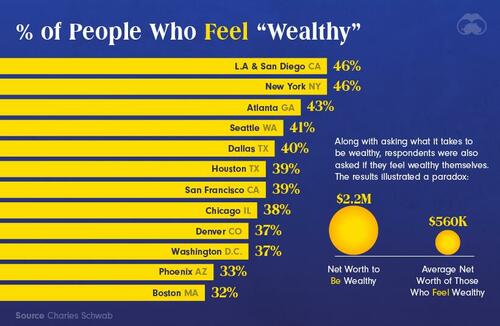How Much Does It Take to Be Wealthy In America?
What does it take to be wealthy in America? It depends, of course, on where one lives.
According to the 2023 Modern Wealth Survey by Charles Schwab (see below), you need a net worth of at least $1.7 million to be "financially comfortable" in San Francisco, and $4.7 million to be considered "wealthy."
And in Houston? $606k is "financially comfortable," while $2.1 million is "wealthy."
As Visual Capitalist's Dorothy Neufeld notes:
Wealthy in America: A Closer Look
Overall, the net worth that Americans say that is needed to be “wealthy” in the United States is $2.2 million in 2023.
Here are the average wealth numbers indicated by respondents across 12 major U.S. cities, based on a survey of 1,000 people between 21 and 75:
In San Francisco, respondents said they needed $4.7 million in net worth to be wealthy, the highest across all cities surveyed, and more than double the national average.
This figure dropped from last year, when it stood at $5.4 million. The vast majority of people in San Francisco say that inflation has had an impact on their finances, and over half say that living in the city impedes their ability to reach their financial goals, citing steep costs of living.
In Los Angeles and San Diego, it takes $3.5 million to be wealthy, the second-highest across cities surveyed. In New York, it takes $3.3 million in net worth to reach this target. It is home to over 345,000 millionaires, the highest worldwide.
Houston, where the cost of living is less than half of San Francisco, respondents said a net worth of $2.1 million is needed to be wealthy. The average salary is $67,000 in Houston, while in San Francisco it falls at $81,000.
The Wealth Paradox
Separately, the survey asked whether respondents “feel wealthy” themselves.
Overall, 48% of all respondents said they feel wealthy, and those people had an average net worth of $560,000. This is a considerable divergence from the $2.2 million benchmark they said was needed to be wealthy.
Here’s the breakdown for major cities, illustrating the paradox:
Millennials were most likely to feel wealthy, at 57% of respondents, while 40% of boomers felt wealthy, the lowest across generations surveyed.
Explaining the Divergence
When digging deeper, it becomes clear that wealth is not simply a number.
In fact, the survey indicates that many Americans place greater importance on non-monetary assets over monetary assets when they think of wealth.
For instance, 72% said having a fulfilling personal life was a better descriptor of wealth than working on a career, which was only chosen by 28% of respondents. Meanwhile, enjoying experiences (70%) was a better reflection of wealth compared to owning many nice things (30%).
Interestingly, there was a narrower margin in choosing between the importance of time (61%) over money (39%).
Beyond monetary figures, these findings illustrate the layers that influence what it means to feel financially healthy today, and how this affects an individual’s overall quality of life.
https://ift.tt/vUJ9PpY
from ZeroHedge News https://ift.tt/vUJ9PpY
via IFTTT







0 comments
Post a Comment